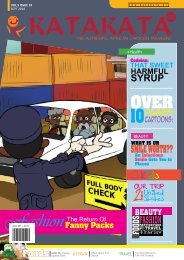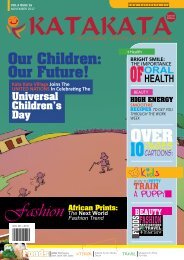KATA KATA magazine vol 8 issue 30.pdf(digital)
- CARTOON: Enough of Female Genital Mutilation - LITERARY: Amanda Gorman’s poem "The Hill We Climb": The Issues of translation, & fragmentation & Identity - HEALTH: Twelve Anti-ageing foods - FASHION: Ten commandments of men’s wear - INTERIOR: Trending paint colours - BEAUTY: Sunscreen products - TECHNOLOGY: Pros and cons of PayPal - LITERARY CORNER: Movies, Poems & Books - KIDs: Binoculars for kids - TRAVEL: Safest Countries In Africa In 2021 - FOOD: Sudanese traditional cuisines - LETTER: Dear Aunt Silvia
- CARTOON: Enough of Female Genital Mutilation
- LITERARY: Amanda Gorman’s poem "The Hill We Climb": The Issues of translation, &
fragmentation & Identity
- HEALTH: Twelve Anti-ageing foods
- FASHION: Ten commandments of men’s wear
- INTERIOR: Trending paint colours
- BEAUTY: Sunscreen products
- TECHNOLOGY: Pros and cons of PayPal
- LITERARY CORNER: Movies, Poems & Books
- KIDs: Binoculars for kids
- TRAVEL: Safest Countries In Africa In 2021
- FOOD: Sudanese traditional cuisines
- LETTER: Dear Aunt Silvia
You also want an ePaper? Increase the reach of your titles
YUMPU automatically turns print PDFs into web optimized ePapers that Google loves.
Zaire Krieger insists that since she shares the same racial
group as Amanda Gorman, she is better positioned
than Marieke Lucas Rijneveld to understand
Amanda Gorman’s social situation, and
to that extent, interpret her poem,
which is a reflection of the poet’s
social condition. In other words, Zaire
Bob Marley famously
says,
Krieger believes that although the three
women share the same gender group
Rijneveld’s racial group as white does not
only give her latent advantages and privileges
over her black counterparts; as a white, it
equally makes it difficult for Rijneveld to grasp
Gorman’s world. Those latent and unwritten
advantages and benefits make it near-impossible for
Rijneveld to fully understand (and perhaps, appreciate)
the black experience. While some critics might accuse
Zaire Krieger of exhibiting the “psychology of race” with
her argument, it is difficult to dismiss such an intense
argument with a wave of a hand.
One can hardly deny that having first-hand knowledge
experience of a situation might not be the same as
that of someone who imagines or understands the
same experience. In as much as one shares
Krieger’s argument, it equally raises numerous
questions. Does one have to belong to
the same group (for example, race) of
a victim to understand the social challenges
and experience of the victim fully? Can’t a
white person understand or feel the segregation
of the minorities? What qualifies one as a social
critic? Would one’s race, as, for example, a white antiapartheid
campaigner, be a barrier against sharing the
same social mind as black minorities? Whatever one’s
take maybe, the one thing is sure: we are
fragmented on different levels and groups.
That fragmentation of individuals leads us to
another question.
“Who feels
it knows
it.”
Is one’s
expertise in a given field of study limited to works related
to their social group?
In other words, can, for example, a
literary critic from a particular social
background interpret an academic
assignment written by someone from
another social group? As much as one
might share Zaire Krieger’s argument
that Marieke Lucas Rijneveld is not close
to Amanda Gorman in both origin and
genre, some might insist that Rijneveld,
by way of professionalism, is qualified to
translate Amanda Gorman’s poem “The
Hill We Climb.”
Professor of Modern Dutch Literature
Thomas Vaessens sees a different
problem in choosing Rijneveld.
“Rijneveld is an author and poet,
but not a translator. And that is
fundamentally different, argues
Vaessens. “A translator has to
translate the meaning of the
original text,” he explains. “You
can be such a good writer, but
you have to get into the text
when translating to realise all
the meanings there are. That is a
special profession”.
If Krieger was chosen based solely on
her profession as a translator, that
decision is understandable, as it justifies
Vaessens’ argument above. But was
22
that so? The idea for choosing Krieger
over Rijneveld was because the former
is “closer to the Gorman, in both
origin and genre.” How does that
choice support Krieger’s criticism of
Meulenhoff’s selection, which Krieger
compares to a film she saw in which an
American actor played a Dutchman?
“Then you hear Dutch, and you
think, why is he doing that? And
that’s exactly what I felt. That does
not mean that a good actor did
not play the role, but you could
also have chosen a Dutchman.
That’s a feeling that a lot of white
Dutch people don’t understand,
but maybe a little more when I tell
it like that.”
As strong as the above argument might
be, it raises another thought-provoking
question: Can a literary critic from a
particular social background interpret
an academic work written by someone
from another social group?
We have many academic authorities
in different fields of study from
different social, racial, and geographical
backgrounds. Many white academics
are experts in black literary works and
2021 | Issue 8 Vol 30 | Kata Kata cartoon magazine
vice versa. Likewise, you have
Africans, Asians, and Europeans
who specialise in different genres,
including black American literature.
Must these specialists share the
same racial, gender, geographical
ties with their field of study to be
accepted as experts in their various
fields? I strongly doubt that idea.
Even though we are the same,
human beings are not the allied
force of nature; we are at the
mercy of inevitable fragmentation.
In the process of healing the wound
of segregation, discrimination,
injustice and inequality, we often,
ironically, bruise those same social
diseases.
While trying to interpret Amanda
Gorman’s poem “The Hill We
Climb,” and build a fair and
egalitarian society, we may have,
instead, exposed human psychology
and the dichotomy in our race,
gender, class, social hierarchy,
which ironically, are the same very
thorny issues “The Hill We Climb”
tries to expose and address. You
now understand better the hill
Amanda Gorman climbs.
















